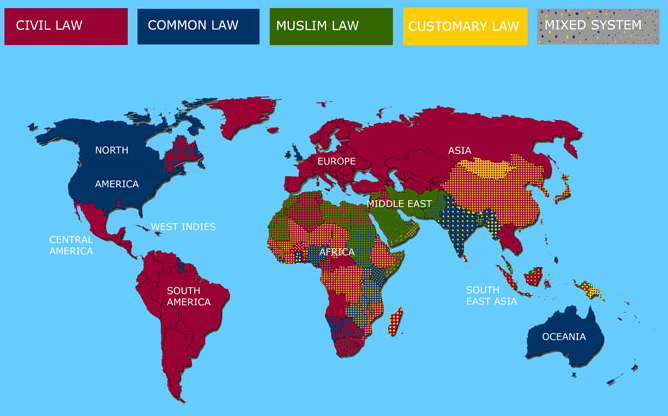
Source: University of Ottawa
The University of Ottawa distinguishes five different legal systems worldwide on the map shown here.
Civil Law System (Statute Law System)
The Civil Law System is based on Roman Law, which was valid from ancient times, first in Rome and later throughout the Roman Empire. The Civil Law System is characterised by the fact that the law is largely defined in general, abstract rules (not related to a specific case), which in turn are codified, i.e. recorded in legal collections (e.g. Switzerland: Classified compilation of Swiss Law). For this reason the Civil Law System is also called the Statute Law System. Of course, countries with a Civil Law System also have a constitution.
Common Law System (Case Law System)
The Common Law System is based on the British common law concept. In this system there are largely no general, abstract rules (<– Civil Law System). Courts decide in concrete cases based on previous court decisions (precedents). For this reason, the Common Law System is also called the Case Law System. As a rule, countries with the Common Law System have a written Constitution in addition to the case law; except in the United Kingdom (UK).
Muslim Law System (Islamic Law System, Sharia Law System)
The Muslim Law System (also called Islamic Law System or Sharia Law System) is derived from the religious precepts of Islam, particularly the Quran and the hadith. In Arabic, the term sharīʿah refers to God‘s immutable divine law and is contrasted with fiqh, which refers to its human scholarly interpretations (Wikipedia). In business, the religious rules of Islam can for example have an impact on banking and finance (s. Wikipedia: Islamic banking and finance).
Customary Law System
Customary law is unwritten law which is not created by legislation but is based on the long-term application of legal concepts and rules which the parties involved in legal transactions accept as binding. The highest courts of justice and the written word recognise customary law as equal to laws. Customary law generally exists in every legal system. However, there are, although rarely, legal systems in which practically only customary law is applied.
Mixed Legal Systems
As the map above shows, there are regions of the world where only one of the legal systems explained applies. However, there are also regions of the world in which the systems mentioned are combined. Such systems are called Mixed Legal Systems.
Alignment of Civil Law and Common Law Sytems
The legal systems of Civil Law (Statute Law) and Common Law (Case Law) are increasingly converging. While the Civil Law System has more and more jurisdiction and the courts sometimes have a wide margin of discretion (as in Switzerland, where the legal statutes are relatively concise and very general), governments in the Common Law System are increasingly forced to implement law based on international agreements (such as Copyright Law in the USA –> Copyright Act) by means of laws, i.e. codified law.
Impact of the legal system on legal work
The legal systems also have a direct influence on the work of lawyers in the country concerned. For example, the amount of research required in a country with a Common Law System, i.e. Case Law, is enormous because it is not primarily the codified law that is applied, but rather the cases decided by the courts. This is true, for example, of the work of lawyers in the USA. In Switzerland, on the other hand, a country with a Civil Law or Statute Law System, lawyers primarily apply the codified law and then supplement it with appropriate cases decided by the courts. In practice, this is a completely different process and much less time-consuming. However, the systems become more similar in this respect. While digitisation has greatly facilitated the research work of US lawyers, digitisation has led Swiss lawyers to include more court decisions in their work because of the simplification of the search. Up until now, decisions made by the Federal Supreme Court, as the highest instance, were primarily cited. However, decisions by cantonal courts are now beginning to be cited too.
